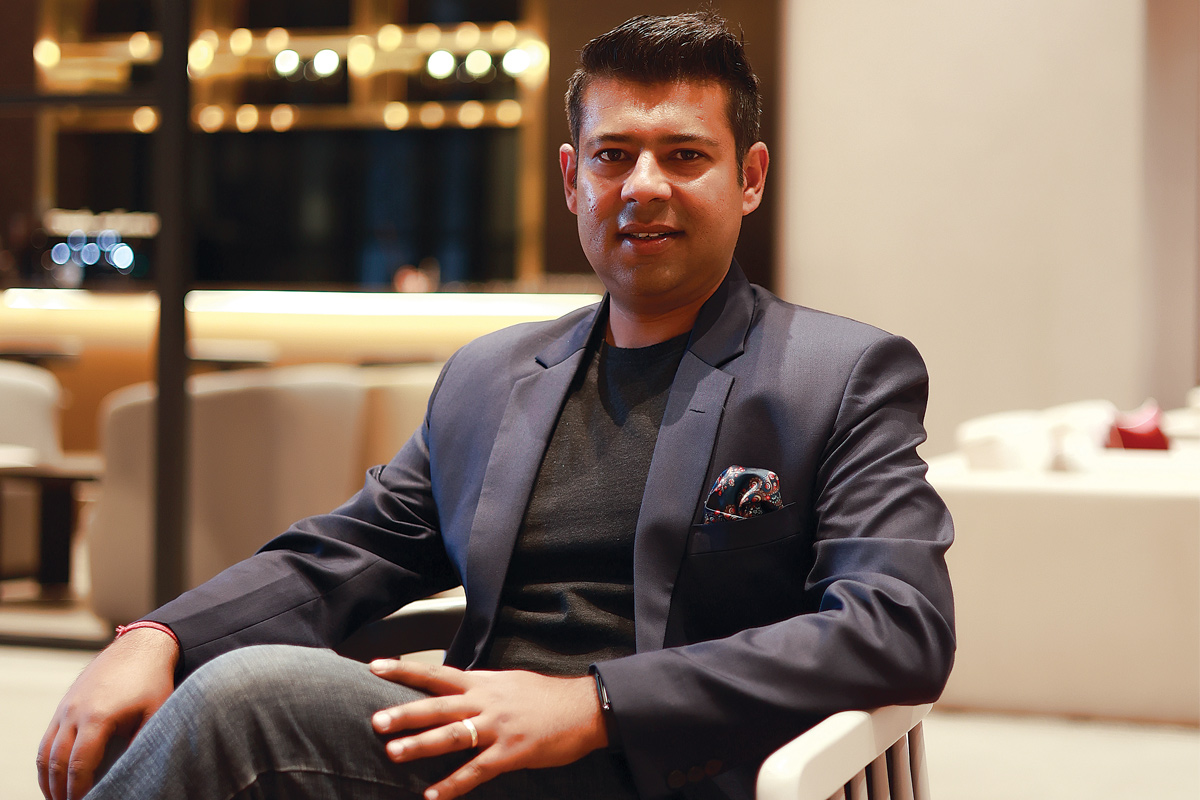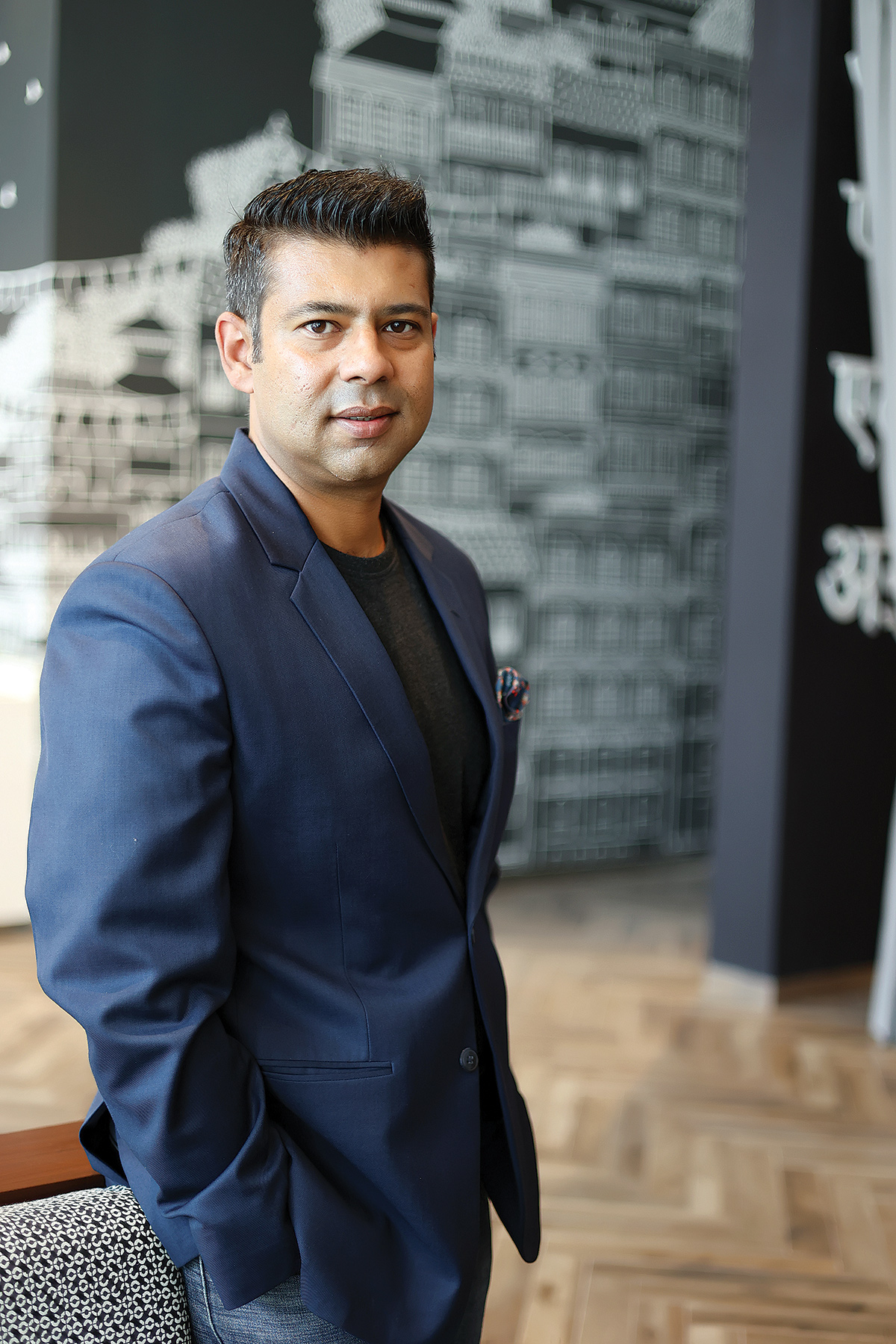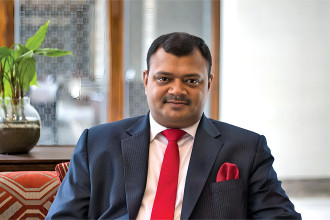
Varun Talwar is the General Manager of the much awaited Hyatt Place Kathmandu that will open its doors for business in November this year. Starting out as a Management Trainee in 2004, Talwar has over 17 years of experience working in reputed hotel brands in Nepal and India. As a professional, he is known for excellence in meeting objectives through independent action, prioritisation and persistence. Hyatt Place opens for business in challenging times but Talwar recognises this as an opportunity and is confident that the hotel is set for success. Excerpts of a conversation with Business 360:

What is a Hyatt Place Hotel and how is it positioned in the Hyatt brands portfolio?
Under the Hyatt umbrella, Hyatt Place hotels are positioned as upscale hotels under the Timeless portfolio. The Hyatt Place brand was created with the help of our guests and the select service experience was reimagined. The brand focuses on creating a place that offers 24/7 convenience, stylish spaces and casual, modern comforts inspired by a conversation with guests — imagined by them, for them. The brand strives to see the world through the eyes of our guests, respond to their evolving needs which allows it to deliver refreshingly uncomplicated experiences that feel authentic, intuitive and modern.Who is a Hyatt Place customer?
The brand was designed to cater to the ‘smart self-reliants’. They are ambitious professionals who are constantly trying to balance the demands of work and life while on the road. They are a practical bunch – they need a place where they can be productive, they appreciate when their loyalty is recognised and they love getting the most value for their money. And even though they are travelling for work, they are most comfortable in a laid-back and casual environment where they can be themselves. Hyatt Place Kathmandu will cater to a diverse section of travellers including the leisure, adventure seekers, religious travellers, business travellers and families with kids.Who are the promoters of Hyatt Place in Nepal?
The Hyatt Place Kathmandu is owned by the Golyan Group under the leadership of Akshay Golyan, Executive Director. The Golyan Group is a diversified group of companies with businesses in hydropower, spinning mills, real estate and organic farming. This is their first foray into hospitality.How is it different to the Hyatt Regency Kathmandu?
Hyatt Regency Kathmandu is an upper upscale luxury brand designed around one objective: to connect today’s always-on traveller to who and what matters most to them. It is designed in a way that each space is multifunctional and can interconnect physically, visually and digitally, so the guests can easily choose the space they need and how they want to use it, no matter the occasion. On the other side, Hyatt Place Kathmandu is designed for a vast section of travellers looking for services in an uncomplicated, purposeful and approachable atmosphere with modern design and transformational spaces.When will you be opening your doors to the public and are there any special offers that we can look forward to?
Hyatt Place Kathmandu will be opening its doors in November, post the festive season when people will be fresh out of the celebrations and will look forward to extending the festivities in a fresh vibrant upbeat hotel with memorable gastronomic experiences. The hotel will have several toolbox offers primarily allowing guests to earn and redeem the World of Hyatt Loyalty programme points. We will also be floating an offer of pay for two nights and stay for three nights and special discounts on food and beverage. Our objective will be to build relations with the local community and have multiple number of guests try our property and give us constructive feedback.
Can you run us through any services targeted to the local residents?
For any hotel, the local community is key and Hyatt Place Kathmandu is no exception. The services at the hotel have been designed to keep the local residents at the centre. We are a 153-room hotel with three suites, seven rooms with sit out terraces and view rooms that face the Swoyambhunath Stupa. The food and beverage offering has been made keeping the local palette in mind with Nepali and Indian cuisine at the heart followed by South Eastern delicacies and all-time favourites like Italian and Mediterranean. The hotel will also concentrate on consistency in quality, taste and freshness delivered at the Zing World of Flavors through its interactive show kitchen. Likewise, The Bar and Zing Sky Bar & Lounge will deliver specially curated beverage mixes besides the straight drinks conjured up by our experienced bartenders. The hotel has 500 square metres of flexible event spaces which can be broken up into multiple smaller venues with natural light that can cater to an array of requirements ranging from corporate networking events to intimate social occasions. The menus for all events are customised as per the guest palette rather than offering run of the mill menus. There will also be 24-hour room service swimming pool, Jacuzzi and a kids pool area. And last but not the least, the driving purpose of the Hyatt brand is to ‘Care for our people so that they can be their best’. That extends not only to the employees but to all guests alike. Keeping in mind the current scenario, the hotel will exhibit its commitment to cleanliness and hygiene through its GBAC certification and adherence to WHO and local laws to instil confidence in the brand.You are opening in one of the most challenging periods that the tourism industry is having to face globally as well as in the country due to the pandemic. What are some of your strategies to meet and mitigate these challenges?
On the contrary, we are confident about the timing of our opening. I agree that the industry has been challenged in the recent past owing to the pandemic but at the same time, its resilience has kept it afloat. With the times improving, we feel that brands like Hyatt Place Kathmandu will benefit greatly as we will provide everything that a global traveller requires at affordable prices with a keen focus on service standards. We are a young, friendly, uncomplicated hotel and I believe that’s what the city needs.How do you view the tourism industry - especially hospitality - faring in the days to come?
I feel that barring the uncertainty in waves of infections, the industry will only be at an upswing. The industry hit a rock bottom and the only way that it can now go is upwards. A terminology that is doing the circles is revenge travelling that will help the industry recover faster. Travellers have been restrained from travel for long enough and with the travel sectors opening, there will be an upsurge in short vacations and business travel. In ways, domestic and international leisure travel will set the tone in the coming days.There is a huge surge in new property developments - hotels and restaurants - in the country. Some experts even say that supply exceeds demand even under normal circumstances. How do you view this?
Development and expansion are necessary evil and we should always welcome them. Large brands are equipped with a strategic vision that is revisited year on year that allows them to absorb the impact besides revisiting the existing segments or identifying new ones. In the same breath, when the supply and demand issues come forth, it is important for the fraternity along with the government to create new demand generators. In case of Nepal, one such example would be of international conventions coming to a country with beautiful settings and infrastructure.What are some of the global travel trends that you think are a positive sign in the coming days as people begin to travel again?
Brands’ concentration on safety and hygiene will be a major factor that will ensure people start travelling again. While technology may have connected people during the recent past, physical presence and connect is still needed and that will fuel travel needs. On a macro level, the economic recovery sought by countries coupled with realignment of rates will also support travel decisions.Quality human resource is seen as a challenge in the country which often translates to quality service standards of a hotel. Your thoughts.
I would have agreed with this point until 2019 as the country sees a huge talent and brain drain to other countries like the Middle East, Australia, US, Korea and Japan to name a few. Owing to the pandemic, migrants have returned to Nepal with international experience, something that the hotels can make use of and provide world-class service true to the brand. This is also an opportunity for the local residents to learn and experience. With the recent experience of the pandemic rendering migrants jobless, they are seeking to stay close in their home country for social and financial security. The presence and emergence of global brands in the home country is giving them confidence and this is a win-win situation for both, the human resource and the hotel.
Published Date: October 11, 2021, 12:00 am
Post Comment
E-Magazine
RELATED Face 2 Face





